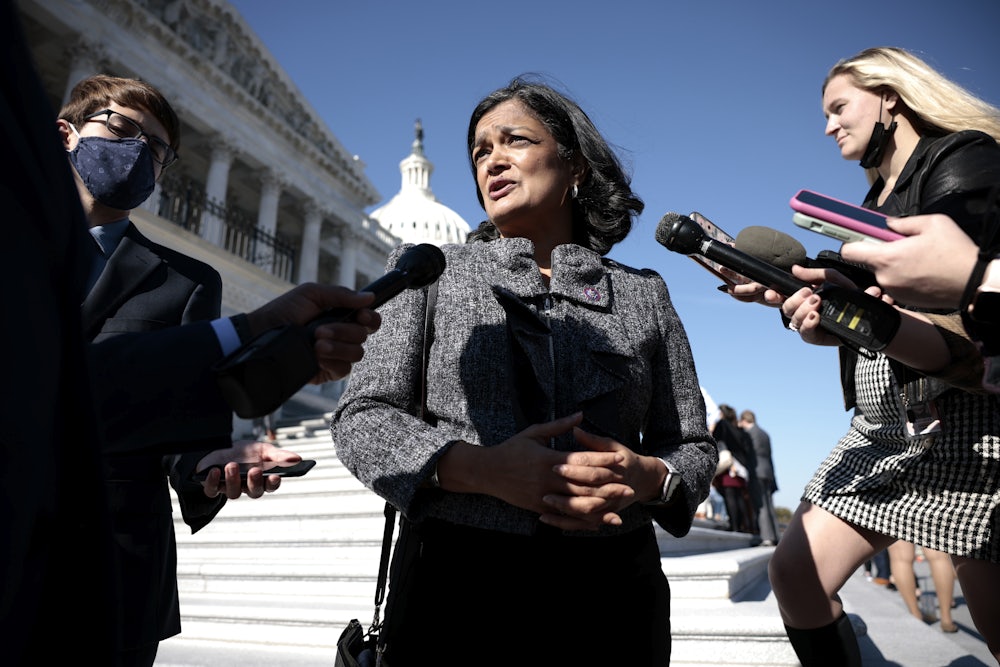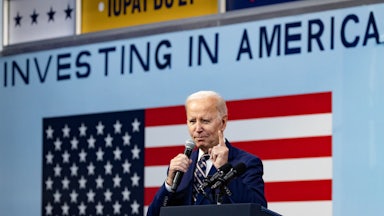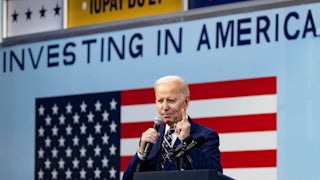Fewer than eight months out from Election Day, some Democrats are appearing to acknowledge that some of their biggest priorities are more likely to be accomplished by executive order than legislative action.
With only a tenuous majority in Congress, Democrats have been unable to pass many of President Joe Biden’s key agenda items on climate change, health care, childcare, and education. The Build Back Better Act is Build Back Deader than ever, and unlikely to be resuscitated. Democratic leadership in Congress seems to have adjusted to this reality and is now turning its attention to goals that can be accomplished on a bipartisan basis, such as beginning the process of reconciling the House and Senate versions of a bill that aims to increase competitiveness with China.
With the legislative channels increasingly closed to them, the Congressional Progressive Caucus is turning to President Joe Biden for succor. On Thursday, it released a slate of proposed executive actions for the president to issue, in order “to address some of the most pressing concerns of the American people, and unfinished business of the Biden agenda,” caucus chair Pramila Jayapal said in a statement. “This isn’t about abandoning the legislative path,” or so a fact sheet on the proposed actions produced by the caucus insists. Rather, it’s about accomplishing what can be done as quickly as possible, to fulfill the promises made by Democrats to the American people.
“I want to again be clear, we’re not giving in or giving up on legislating. That remains critical. It is our best chance to deliver enduring relief and to achieve goals that can only be accomplished through acts of Congress,” Jayapal said in a press call on Thursday, an assertion that might require a persuasion check had it occurred in a game of Dungeons & Dragons. “But this agenda that we’re releasing today is also about recognizing our chance to use all the tools in the toolbox that are available to us, and realizing the promise of democratic governance from every corner.”
Jayapal said that the proposed actions were intended to help working families, particularly as inflation reaches record highs. “That’s how we want to think about this, is, ‘Let’s deliver some relief quickly for people,’” Jayapal said. The comprehensive list of executive actions is a kind of Build Back Better Act in miniature; it would address many of the agenda items the dead-in-the-water legislation had aimed to tackle: climate change and health care costs, as well as progressive wish-list items such as immigration reform and canceling student loan debt. Jayapal said that there had been “a number of staff conversations” involving the White House and that members of the Progressive Caucus planned to have a conversation with Biden himself.
“The focus here was not necessarily to put out every fabulous idea that the progressive movement has but really to focus on things that we think are doable, and we feel pretty good about this list,” Jayapal said.
While executive actions may have the benefit of offering temporary relief, there are some serious drawbacks. The actions of one president can easily be undone by the next administration; think of President Donald Trump backing out of the Paris Climate accord and the Iran nuclear deal and rescinding the Deferred Action for Childhood Arrivals program, or Biden reversing Trump’s actions barring transgender individuals from joining the military and canceling the Keystone XL pipeline. If Democrats lose the White House in 2024, any actions Biden takes can easily be overturned.
A more immediate concern, however, is having actions tied up in the courts. As of early March, 40 multistate lawsuits had been filed against the Biden administration. The Supreme Court, with its conservative majority, has already demonstrated its willingness to rule against the administration. In August, the court blocked Biden’s order extending the federal eviction moratorium. In January, it struck down the administration’s rule requiring that large private companies impose vaccine or testing mandates.
In the unsigned decision blocking the eviction moratorium, the court pointed out that “Congress was on notice that a further extension would almost surely require new legislation, yet it failed to act in the several weeks leading up to the moratorium’s expiration.” Congress had failed to extend the moratorium before it was set to expire in late July, in large part because such legislation would have been unable to pass in the evenly divided Senate and even faced Democratic opposition in the House. “It is up to Congress, not the [Centers for Disease Control and Prevention], to decide whether the public interest merits further action here,” the decision read.
The eviction moratorium decision demonstrates in microcosm the dilemma that Biden would face if he approved some of these executive actions outlined by the Progressive Caucus. Congress is unable to pass certain legislation thanks to the narrow Democratic majority, so Biden takes what executive action he can. Federal courts, perhaps going up to the Supreme Court, find that Biden cannot take certain actions on his own and that some powers are reserved for Congress alone. But Congress is unable to pass that legislation thanks to the narrow Democratic majority. The cycle repeats.
The power of the executive is also being challenged in a lawsuit brought by Republican-led states and coal companies that could prevent the Environmental Protection Agency from regulating greenhouse gas emissions and redefine how agencies can exercise their regulatory powers. The states and companies argue that Congress did not explicitly grant the EPA the power to regulate greenhouse gas emissions. (Interestingly, the case is not predicated on actions that the Biden administration has taken but on Obama and Trump rules that never actually took effect.)
But progressives argue that, despite the specter of these actions being overturned, either by a future president or a court decision, Biden should press forward with issuing these orders. “You can’t be too worried about what happens,” Representative Ilhan Omar told The New Republic. “I think there were a lot of promises made. The American people are looking to [Biden] to lead when Congress isn’t able to.”
Representative Mark Pocan, another member of the Progressive Caucus, acknowledged that executive actions may not be as permanent as passing a bill. “We’re just encouraging the president, since Republicans seem completely unwilling to work with us on almost anything, that the best thing we can do is have him move some of these ideas forward, and then hopefully after November when we have a Senate with a little more of a margin, we’ll be able to get some more done,” Pocan told The New Republic, bucking the conventional wisdom of the pundit class to assume that Democrats would hold control of the House and expand their majority in the Senate. He also scoffed at the idea that Biden should not take action if it may be challenged in the courts.
“So we’re going to say, ‘Don’t do anything’? I mean, clearly we want to move forward, we want to show people that we can work for them,” Pocan said. “These are just alternative paths, given how long now we’ve been waiting for Build Back Better.”
Representative Cori Bush, a member of the Progressive Caucus who slept on the steps of the Capitol for days in protest of the expiration of the eviction moratorium, an action that helped persuade Biden to extend it despite his warning that it would likely be struck down by the Supreme Court, argued in favor of taking action, and damn the potential torpedoing by the judicial branch.
“We do what we can to make sure that, if that does happen, we have the guardrails in place to make sure that we’re able to stand on solid ground. But I think we have to be able to move forward with some of these things,” Bush told The New Republic. “We keep saying, ‘Democrats deliver, Democrats deliver,’ but do the people believe that Democrats deliver? If they don’t feel like we’re delivering, then we have not done our work.”










